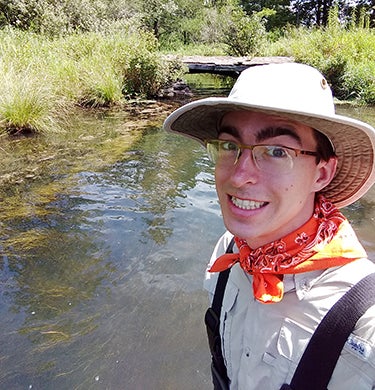
Tyler Hampton in the midst of field research, Augusta Creek, Michigan.
Tyler Hampton, PhD student in Waterloo’s Department of Earth and Environmental Sciences, grew up on the Atlantic coast of the United States, in scenic Cape Cod. Being surrounded by the beaches, boulders, mudflats and shorebirds of Massachusetts influenced his decision to pursue research in the water sector.
After completing his undergrad at University of New Hampshire, Tyler began his Master’s research in chemistry and aquatic ecology at Michigan State University (MSU). He was particularly interested in understanding how water connected these two fields.
“It is incredibly powerful to think about all the pathways and origins of water,” said Tyler. “Specifically, I find the downstream effects of water extremely interesting when looking at the larger picture of a particular ecosystem.”
In 2018, Tyler began his PhD research at the University of Waterloo supervised by Water Institute member and professor of Earth and Environmental Sciences and Civil and Environmental Engineering, Nandita Basu. Encouraged by his supervisor, Tyler joined Waterloo’s Collaborative Water Program to learn how to work with and understand colleagues outside of his home department.
“There isn’t a graduate program like the Collaborative Water Program in North America, “said Tyler. “Being in a room with scientists, engineers, health scientists, mathematicians, and governance experts, ignites conversations that are an extremely valuable biproduct of research. It is a rare opportunity and one that has contributed positively to my PhD research.”
Currently, Tyler is working on the Natural Sciences and Engineering Research Council (NSERC) funded project, forWater. This project will provide new knowledge to address challenges for drinking water security connected to natural disturbances and forest management responses. It brings together 25 researchers across nine Canadian Universities in collaboration with over 60 young professionals and industry partners to better understand, protect, and enhance drinking water source protection in Canada and abroad.
Tyler works in an interdisciplinary team to understand how the impacts of natural disturbances and management practices on forested landscapes affect different parts of the watershed, including how different hydro-ecological characteristics and forest harvest strategies influence water supplies.
“I think the most important part of forest management is understanding how water quality behaves when we choose to take no action, and how it behaves when we implement sustainable strategies.”
Tyler hopes that the small details and universal properties of his research can ultimately be scaled up and applied on a larger and broader scale.